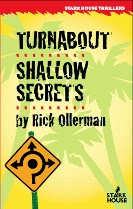for the entire interview go here:
http://danaking.blogspot.com/2014/09/twenty-questions-with-rick-ollerman.html
Rick Ollerman was born in Minneapolis but moved to more humid
pastures in Florida when he got out of school. He made his first dollar from
writing when he sent a question into a crossword magazine as a very young boy.
Later he went on to hold world records for various large skydives, has appeared
in a photo spread in Life magazine, another in The National
Enquirer, can be seen on an inspirational poster shown during the opening
credits of a popular TV show, and has been interviewed on CNN. He was also an
extra in the film Purple Rain where he had a full screen shot
a little more than nine minutes in. His writing has appeared in technical and
sporting magazines and he has edited, proofread, and written numerous
introductions for many books. He's never found a crossword magazine that pays
more than that first dollar and in the meantime lives in northern New Hampshire
with his wife, two children and two Golden Retrievers.
Rick was also the editor at Stark House when Grind Joint was
published, providing good advice and patience with a newbie above and beyond
what anyone could expect. Not too many editors would pack their families in the
van and drive from New Hampshire to Pittsburgh to be there when an author broke
his launch cherry, as Rick did for me, and for that I will always be grateful.
He has a twofer coming out from Stark House: Turnabout and Shallow
Secrets, and agreed to sit for Twenty Questions. (I thought
about making him answer Forty Questions, but he’s a friend.)
One Bite at a Time: Tell us about Turnabout and Shallow
Secrets.
Rick Ollerman: Turnabout is a revised
incarnation of the first novel I ever wrote, some years ago. I wanted to create
a book that could only take place in Florida, where the Everglades played a
central role, and where structurally the book leads to moving not just from
scene to scene, but location to location. I think the conclusion is one of
those serendipitous things where not only is it perfectly logical but also
completely unexpected–without cheating. Shallow Secrets was
the second book I wrote and it was done in large part much differently
than Turnabout. I wanted to write in a different style that
addressed any of the issues I myself had with the first book.
OBAAT: Where did you get this idea, and what made it worth developing
for you? (Notice I didn’t ask “Where do you get your ideas?” I was careful to
ask where you got this idea.)
RO: I actually sort of like the “Where do you get your ideas?”
question because I think I’ve been coming up with an answer. A writer observes
everything, and then, being creative, they ask themselves, “What if?” For
instance, in my third book (which comes out next year), I had read FBI
documentation that stalking is the only real predictor we have of murder.
That’s the observation. The “what if” is, what if you’re a person qualified to
recognize the signs, and the target is someone you care about? What do you do?
(More “what if.”) If you go to the cops, you make yourself known to them and it
likely escalates the problem. If something happens to the stalker, the victim’s
co-workers already know something strange is up. In other words, once you raise
that flag trying to protect your loved one, there’s no hiding. But you can’t
take it down again, either. The rest grows deeper from there.
Turnabout’s “what if” had to do with the early days of the
Internet, and the question is, how do you track crooked money when the
transactions occur over the Internet? Turn the computer off and the evidence is
gone. Today, of course, we have tools that let us do this much better, but back
then….
Shallow Secrets was a cop, implicated by a killer who he
had let crash in his house. He hadn’t known he was a killer at the time, and
when evidence is found in his home later, he’s stigmatized by the wrong color
brush. What can he do to redeem himself in light of the fact that not all the
murders had been solved? Nothing. He walks away. So years later, when a killing
takes place up north, he gets pulled into it by the accused by way of a female
reporter. The question is if these later crimes can exonerate him from the
earlier ones.
OBAAT: How long did it take to write Turnabout and Shallow
Secrets, start to finish?
RO: Turnabout took about ten months, and then
later the first third was rewritten. Shallow Secrets was about
the same, excluding the computer problem that ate the ending and required the
last half to be rewritten. Gee, that was fun.


Fine interview, I will be snapping this up as I have most of the Stark House pubs.
ReplyDelete